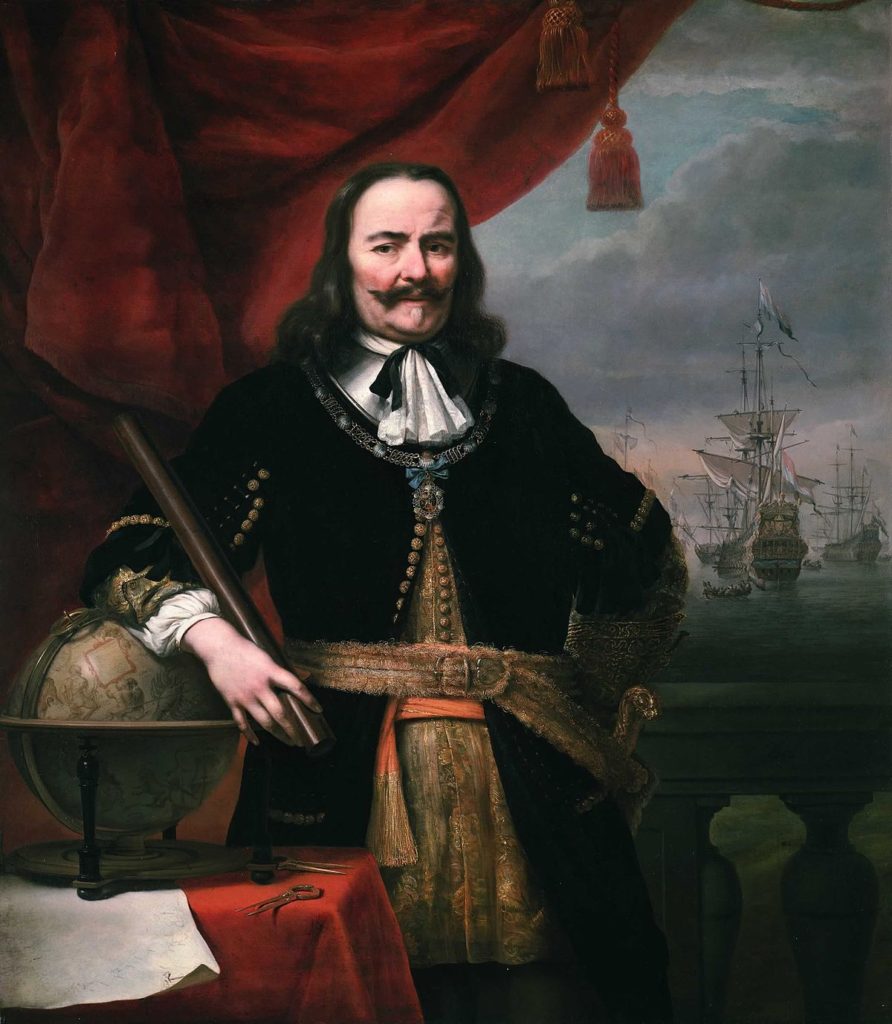By Jonathon Van Maren
As soon as I landed at Schipol Airport, I mapped my way to Nieuwe Kerk (New Church) in the heart of Amsterdam. It is inside that beautiful old church, host to royal weddings and one of the grandest pipe organs in the Netherlands, that Admiral Michael de Ruyter is buried.
De Ruyter is one of the greatest Dutch naval heroes, a man who is virtually unknown outside of the Netherlands despite the fact that he dealt the English one of the greatest naval defeats in their history. As a Dutch-Canadian, I grew up reading about de Ruyter (a little book called Salt in His Blood by William Rang was read and re-read), especially his daring rescue of twenty-six Hungarian pastors who had been sentenced to die behind the oars of a Spanish galleon as galley slaves for refusing to recant their Reformed faith. There had been three hundred clergymen originally—all the rest had perished miserably on the long death march to the ship.
In Hungary, de Ruyter is still celebrated—the little old lady behind the information desk at Nieuwe Kerk showed me the locked door to the crypt where one can see de Ruyter’s casket resting at the foot of a little brick staircase, with several wreaths and ribbons laid across the lid. They were placed there by a Hungarian delegation who, over three hundred years later, still remember what de Ruyter did for their beleaguered co-religionists, and still trek to Amsterdam on anniversaries to pay their respects. There is a monument to de Ruyter in Budapest, and on the 325th anniversary of de Ruyter’s rescue a ceremony was held, attended by the Dutch ambassador and several Hungarian Reformed pastors who had been imprisoned in Soviet concentration camps for their faith.
But just as debates rage about Robert E. Lee statues in the United States, and Sir John A. MacDonald in Canada, and even Winston Churchill in Great Britain, there are some in the Netherlands who have decided it is time to pipsqueak angrily about Michael de Ruyter’s legacy. Next to his magnificent funeral monument, where the marble man lays stretched out with his head resting on a cannon backed by a naval battle scene, is a little plaque describing how de Ruyter had been laid to rest in 1677 after his leg was blown off by a cannon ball in battle, “flanked by Strength and Caution and…martial attributes.”
And, the plaque adds in way of closing, “Nowadays his name is increasingly linked to the debate on the Republic’s slave trade.” I’m not sure when that little addendum was attached to de Ruyter’s biography—and at his funeral monument, no less—but his name is “increasingly linked to the slave trade” by the usual suspects—self-righteous revisionists who insist on demonizing any historical hero that comes to their attention. This example is particularly nonsensical because de Ruyter often freed slaves by redeeming them at his own expense—nearly 3,000 of them, by some counts. One of de Ruyter’s detractors responded to this legacy by saying derisively that this scarcely counts for anything, because those slaves were largely Christian.
The accusations seem to stem from vague assertions that de Ruyter was a “colonialist” and a “protector of the Dutch slave trade.” The Dutch slave trade is certainly one of the blackest pages in the history of the Netherlands, with the actions of the Dutch West India Company being particularly heinous. But the assertion that de Ruyter played any significant role in this dark history are entirely limited to the fact that as a naval officer, he was tasked by the Dutch government with retaking colonial territory in West Africa from the English—territory that included two slave fortresses. De Ruyter’s detractors cannot point to anything de Ruyter did other than these military operations against a foreign aggressor that warrant smearing a man who spent his own funds to free slaves as a champion of the slave trade.
This sort of iconoclasm lends nothing to a nuanced historical discussion about what we can learn from the past—it simply asserts that those who lived in a different time with different injustices and evils than we live with today are villains because they do not think like us and act like us and sin like us. It always brings to my mind a brilliant analysis from G.K. Chesterton’s What’s Wrong With the World:
The modern mind is forced towards the future by a certain sense of fatigue, not unmixed with terror, with which it regards the past. It is propelled towards the coming time; it is, in the exact words of the popular phrase, knocked into the middle of next week. And the goad which drives it on thus eagerly is not an affectation for futurity. Futurity does not exist, because it is still future. Rather it is a fear of the past; a fear not merely of the evil in the past, but of the good in the past also. The brain breaks down under the unbearable virtue of mankind. There have been so many flaming faiths that we cannot hold; so many harsh heroisms that we cannot imitate; so many great efforts of monumental building or of military glory which seem to us at once sublime and pathetic. The future is a refuge from the fierce competition of our forefathers. The older generation, not the younger, is knocking at our door…The future is a blank wall on which every man can write his own name as large as he likes; the past I find already covered with illegible scribbles, such as Plato, Isaiah, Shakespeare, Michelangelo, Napoleon. I can make the future as narrow as myself; the past is obliged to be as broad and turbulent as humanity. And the upshot of this modern attitude is really this: that men invent new ideals because they dare not attempt old ideals. They look forward with enthusiasm, because they are afraid to look back.
___________________________________________
For anyone interested, my book on The Culture War, which analyzes the journey our culture has taken from the way it was to the way it is and examines the Sexual Revolution, hook-up culture, the rise of the porn plague, abortion, commodity culture, euthanasia, and the gay rights movement, is available for sale here.









Having conquered the most vulnerable and defenseless living, we now lay waste the defenseless dead. We should expect our reward for pissing on ancestors to be descendants mercilessly shitting on us.
Objective morality was the floor upon which generations stood in solidarity with each other despite their faults. Its removal has left us hanging upon the joists. And our knuckles are aching; our fingers loosening. The very young and old shall be the first to slip off, and we shall watch them plummet, unable to stretch out a single hand.
We have summarily executed the family. Next the individual will stand trial. Watch now as moral relativism slips out from the darkness, slithering this way and that: no institution will be spared its poison; no flesh its fang; no moral its lure. For as a compass is useless when standing upon a pole, what good is a moral compass when Self stands as the highest standard? Would the needle not spin chaotically in search of direction?
Ah, but it beckons: stop searching, my child. Self is all that is, ever was, or ever will be.